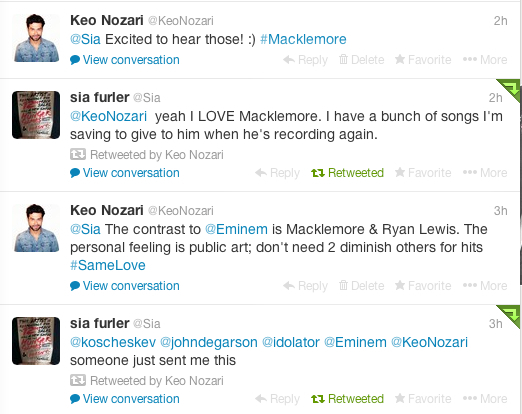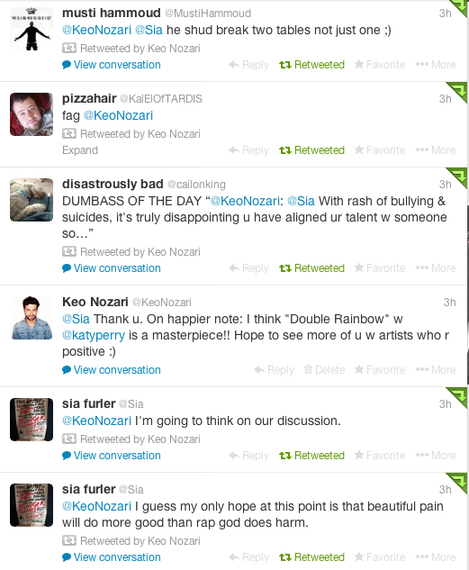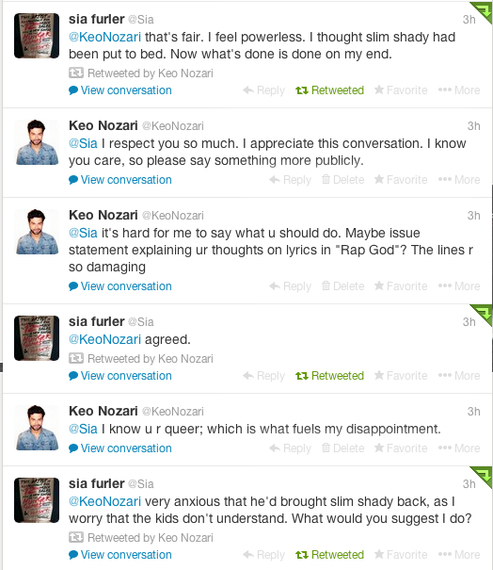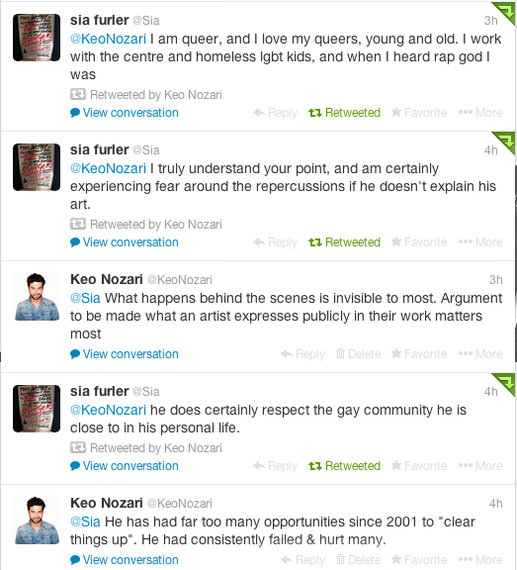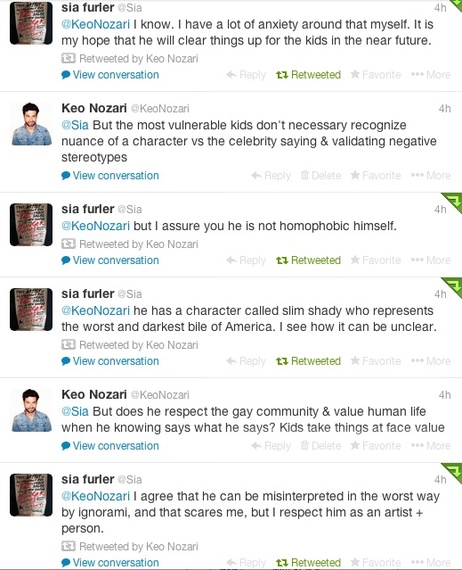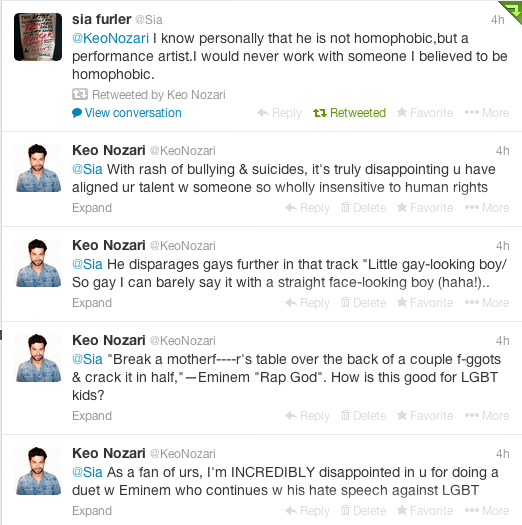
"Break a motherfucker's table over the back of a couple of faggots and crack it in half."
--Eminem, "Rap God"
That was just the first gay-hating verse. It upsets me that after all this time -- since 2001, to be specific -- Eminem still insists on using hate speech against people like me in his music. Some may deem pop and hip-hop lyrics "unimportant," but music being a medium that I work in, I know firsthand the power that it wields to influence and affect lives (as I'm sure millions more can attest). Time and time again, Eminem has been informed about the negative impact that his hate speech has on the lives of the gay community, and although he's given some non-apologies to the likes of Anderson Cooper and issued platitudes about how he doesn't care what you are as long as you're "nice to me," he continues to create derogatory lyrics against us.
What upset me further was that Sia, an openly queer artist whom I deeply respect and have followed for 14 years, decided to write and sing a duet on the same album that features "Rap God." Sia is currently in the midst of several spectacular years in her career: She has written massive hits for Rihanna and Flo-Rida, co-wrote and sang David Guetta's "Titanium," and is in high demand for collaborations with major players like Beyoncé and Katy Perry, whose "Double Rainbow" with Sia is a highlight of her new album, Prism. So, how could she do this knowing Eminem's extensive anti-gay history and considering that she didn't need to work with him at this point, and especially during a time of horrible anti-gay bullying and LGBT suicides?
So I wrote to Sia on Twitter and expressed my disappointment. I wasn't expecting a reply, but, to my surprise, she responded and thoughtfully listened, and we proceeded to have a lengthy (by Twitter standards) conversation. She initially defended Eminem ("I know personally that he is not homophobic, but a performance artist"), but it was clear from her responses that there was a bit of buyer's remorse about working with him after hearing "Rap God." She was refreshingly honest: "I truly understand your point, and am certainly experiencing fear around the repercussions if he doesn't explain his art." Considering his 13 years in this arena, I would guess that that's unlikely. She went on: "I am queer, and love my queers, young and old. I work with the Center and homeless LGBT kids, and when I heard 'Rap God' I was very anxious." She explained, "He has a character called Slim Shady who represents the worst and darkest bile of America. I see how it can be unclear."
It's true. The argument that "he's just playing a character" assumes that listeners -- and notably the teens who are most vulnerable to bullying -- recognize all the nuances and are sophisticated enough to discern the difference between a celebrity who is perpetuating and validating negative, homophobic stereotypes and an artist who is playing a "character" or a "persona" while his private personal beliefs supposedly differ. But something that is private, by the very definition of the word "private," is not generally meant for the public to know, so I tweet: "What happens behind the scenes is invisible to most. [There is an] argument to be made [that] what an artist expresses publicly in their work matters most." Few will remember or see what an artist says in a interview. What remains is the music. And if the message is derogatory, then that's ultimately what sticks.
Eminem's fans on Twitter clearly illustrate my point. After my conversation with Sia, they immediately piled on the very terms that I was arguing against, directing them at me and even at Sia: "Fag," "Stop Being a Faggot," "Shut Up Pussy." One even advocated violence, taking his cue from the same lyric quoted above, telling both Sia and me, "he [Eminem] shud break two tables not just one."
Indeed, through his lyrics, Eminem validates that very language and empowers them to use such hate speech.
"You fags think it's all a game till I walk a flock of flames off a plank, and tell me what in the fuck are you thinking."
--Eminem, "Rap God"
Fortunately, I'm a grown, confident man, but I remember what it was like to be a young gay boy growing up in small-town Minnesota. And I know what pop lyrics mean to impressionable teenagers, gay or straight. The CDC reports that eight out of 10 LGBT students are verbally harassed in school, and one in four has been a victim of physical assault. Then there are the suicides: LGBT teens are two to three times more likely to commit suicide than other teens. It's easy to see the correlation between hate speech that is validated by pop-culture figures like Eminem and the real-life repercussions that it has on human lives.
Derogatory language against other minorities has recently seen notable pop-culture figures meet spectacular career deaths. Paula Deen's use of the "N" word resulted in the loss of her most lucrative contracts, from the Food Network to a book deal to product endorsements. Mel Gibson's anti-Semitic remarks, culminating over years and hitting a pinnacle with his public tirade during an arrest in 2006, deeply tarnished his career. Many celebrities defended Gibson, saying that, in their experience with him, "he's not really an anti-Semite" behind the scenes. Yet the words he used publicly, and also those that were recorded privately and leaked, suggest otherwise. But what happens when a popular rapper releases violent hate lyrics against gays? He is lavished with praise by Time, Rolling Stone and MTV News (to name a few).
I personally believe that there is no room for homophobia in pop culture in 2013. The success of Macklemore and Ryan Lewis alone, and specifically the popularity of their beautiful, heartfelt "Same Love," prove that you don't have to disparage gays in hip-hop, that you can in fact lift them up and still have massive chart success and financial gain. It is only when we raise up artists like these and call out the homophobes for what they are that love wins. I tweeted to Sia about my love for Macklemore, explaining his contrast to Eminem: "The personal feeling is public art; don't need 2 diminish others for hits." Sia responded, "yeah I LOVE Macklemore. I have a bunch of songs I'm saving to give him when he's recording again." Now that's a collaboration that I can be excited about.
As for Sia on her Eminem collaboration, she tweeted to me, "I feel powerless. I thought Slim Shady had been put to bed. Now what's done is done on my end. I guess my only hope at this point is that 'Beautiful Pain' [her song with Eminem] will do more good than 'Rap God' does harm." Agreed. But what really gave me hope for artists not working with hate-mongering performers was that our conversation gave her pause for reflection. She wrote, "I'm going to think on our discussion."
What are your thoughts about Sia collaborating with Eminem? Sound off in the comments below.
Here are some screen shots of my Twitter conversation with Sia:
